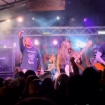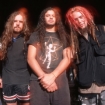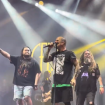When a band drops a record just about the only people that really care about production credits are audiophiles and technical nerds. But when that producer is Arthur Rizk — whose recent works includes such rippers as Power Trip's Nightmare Logic, Code Orange's Forever, Pissed Jeans' Why Love Now, Inquisition's Bloodshed Across the Empyrean Altar Beyond the Celestial Zenith, Trapped Under Ice's Heatwave and Prurient's Frozen Niagara Falls — it might be worth your time to pay attention. Rizk is one of the hottest producers in metal right now, and he's only getting hotter, having just wrapped a stint with the Cavalera brothers for their highly anticipated new album, Psychosis.
What's more, Rizk's involvement with music is not limited to sitting behind the soundboard. 2016 saw the release of a debut LP by his long-in-process brainchild Sumerlands, which modernizes Jake E. Lee–era Ozzy-inspired classic heavy metal. Rizk also plays a crucial role in another classic-sounding heavy-metal band, Eternal Champion, as well as a pair of notable hardcore bands, War Hungry and Cold World. And he's been known to play guitar in any number of other projects including — but not limited to — Power Trip and Stone Dagger, and make noise as part of the Hospital Records stable. When it comes to music, especially that of the extreme ilk, Rizk does it all, and remarkably well.
With all of this in mind, we asked Arthur Rizk about his background, his involvement in a slew of upcoming releases and the genesis of a few key alliances with bands like Inquisition, Cold World and Prurient.
YOU GREW UP IN PENNSYLVANIA — WHEN, AND HOW, DID YOU FIRST GET TURNED ON TO EXTREME METAL?
ARTHUR RIZK I'm from Easton, Pennsylvania, which is about an hour-and-a-half north of Philadelphia. I've been playing music since I was 13 — that's when I started playing guitar. And I started playing in local bands and ended up getting into noise when I was 19. There was this great place in Allentown that used to have insane noise shows from artists from all over the world. Crazy, extreme shit. The first time I saw Prurient was in a warehouse in Allentown, Pennsylvania.
Basically, I was really into all metal, but when I found out about noise, it was something that seemed even more extreme than black metal. I was obsessed with it. That's kind of where I amateurishly started recording, doing noise projects. I wanted to be able to do everything on my own and streamline the process by myself, so I started recording at my community college probably about 2006 or 2007.
I didn't really know what the fuck I was doing, but I took one class and everything else I just figured out. To this day, I'm buying tons of books on the recording process before everything was done in Abelton or ProTools or whatever. I'm still learning all the techniques even though I went to college for it for a little while.
HOW DID YOU GET INVOLVED WITH WAR HUNGRY AND THE BLOOMING HARDCORE SCENE IN WILKES-BARRE?
My good buddy Alex Metz got me into the band War Hungry, inviting me to scab. We were just friends from being from the same place and moving to Philly. I thought hardcore was so fucking boring — just power chords or whatever. It took me until I started playing shows with them and becoming friends with Nick Woj from Cold World, Alex Metz's roommate at the time, that I got into it.
Nick and I started hanging out because he thought I was such a freak. He loved that somebody was weirder than him. He played me Leeway's album Desperate Measures and that blew my fucking mind. I could not believe it, and it totally made me understand hardcore. It made me want to kill people and I totally understood hardcore all of a sudden. So crossover was my bridge into hardcore.
HOW DID YOU GET HOOKED UP WITH IRON AGE — THROUGH THE POWER TRIP GUYS?
So with Iron Age stuff, I was playing with them at that time, touring with them and they had just done basically what was their last tour. They had these demos that Wade [Allison, guitar] recorded and he brought them to my house. I mixed them and added some shit. We did some experimentation, too, like adding the snare drum through a full stack of Marshall amps. It just sounded crazy. The whole Saga Demos thing is a good example of early experimentation. I didn't really know what I was doing, but it ended up sounding cool. Wade paid me for it with a Number 5 meal from Taco Bell. [Laughs]
IN ADDITION TO THE POWER TRIP AND CODE ORANGE RECORDS, YOU HAD A HAND IN THE NEW TRAPPED UNDER ICE ALBUM, AS WELL ...
I didn't even really listen to old Trapped Under Ice before I recorded Heatwave. I had almost no frame of reference. They sent me some tracks and I jammed them really quick, but I had no frame of reference. I just wanted to ... whatever they wanted to do. Just go for it. And make sure everything sounds cool to me in the meantime. I think that they wanted to have someone who was going to try everything that they wanted to try. I was just kind of throwing out crazy ideas and filtering out bad ones, more or less. And throwing out some bad ones too. [Laughs]
YOU STARTED RECORDING IN 2006, AND — BY YOUR OWN ADMISSION — HAVE BEEN EXPERIMENTING EVER SINCE. WHY DO YOU THINK A VET LIKE PRURIENT PICKED YOU AS PRODUCER?
We toured together and I did sound for Cold Cave in 2011 for a couple months. I think [Prurient main man Dominic Fernow] knew that somehow I knew what I was doing, at least a little bit. He was probably going on a hunch and putting all his trust in me. A couple years later, he saw that I had done the Inquisition record and I think that he was really psyched that I did something instead of just making easy, steady money on the road. Plus the fact that I had a decent understanding of both noise and metal, and also higher-end recording.
FROM PRURIENT, VATICAN SHADOW AND SUMERLANDS TO PISSED JEANS, POWER TRIP AND TRAPPED UNDER ICE — YOUR RESUME PRETTY MUCH HITS EVERYTHING FROM TECHNO TO NOISE TO HARDCORE AND EVERYTHING IN BETWEEN. WHAT WOULD YOU SAY IS YOUR CORE COMPETENCY AS FAR AS STYLES OF MUSIC?
There's a multitude of reasons why I function this way. The first, I'd say when it comes to producing music, is that I want to be needed on a record. I want there to be a use for me because I'm not traditional — I like to be involved in different ways whether it's just as simple as realizing what the band wants on the record or what they want the record to sound like or figuring out a way to get them there. That's the first thing, and genre isn't a thing. I just want to be able to help. I'll take a stab at anything just to be able to make something and help someone out. So that's first and foremost.
The second thing is, I think that I've just always been into heavy metal and playing guitar, so guitar music is a big thing for me. And I know noise isn't guitar music, but it is sometimes. Even that Prurient record, which is a lot of synth stuff, we still put 12-string acoustics on it and all kinds of guitar stuff. Guitar is something that I obsessed over my whole teenage life, so I just love working with guitar bands. I don't care about aesthetic. It could be like indie rock — I just want to know that there are some cool guitar riffs.
HOW DID YOU CONNECT WITH THE CAVALERA BROTHERS?
I was friends with Igor before I was friends with Max. Igor is involved with his project Mixhell, which is techno-type stuff, so he and his wife they play in Soulwax with this insane band where there's three drummers and two people doing synths. He's part of a different underground. Igor knew about my work with Vatican Shadow. I ended up connecting with Max later when I drum tech'd for Igor for, like, a week during some Cavalera Conspiracy dates.
Max and I initially connected by listening to the NWOBHM band Satan — he was just like, "I didn't know you knew Satan. This is one of my favorite records." So we connected over that and then I played Max some of the stuff that I've worked on like the Code Orange record, the new Power Trip, etc. I guess after I left they discussed me joining on as a producer.
When I was learning how to produce, I studied Chaos A.D. and Beneath the Remains by Sepultura. I studied Arise. I couldn't believe the shit they were doing on those records — the intros with reverse vocals that kick in, the synths. I took all that and made that my own. And I told Max while I was recording, "I should be paying you for all these ideas I've taken from you over the years." He was just psyched to be doing stuff — to be exploring those things again. We sat down and listened to old Sepultura, Judas Priest and tons of Eighties shit, tons of death metal. We would talk about what we like about everything and that gives me such a broader range to work with.
And they really do know like everything that's going on in the underground. Most of the time they try to get younger bands that they like to tour with them. Max is literally just jamming new shit constantly, trying to find new stuff. I was just showing him Canadian war metal, Blasphemy and all of that.
HOW DID YOU GET INVOLVED WITH INQUISITION?
I just was a fan and I did sound for them in New York City once. They never had good sound any time I saw them in years previous, so I asked to get in touch with them. I just showed up and did a killer job, and afterwards I introduced myself to [Inquisition frontman] Dagon and was like, "Hey man, if you guys ever want to come to my studio, hit me up." We stayed in touch and bonded over classic heavy metal. That seems to be the revolving theme in my stories, bonding with people over Eighties guitar amps and classic heavy metal.
WHICH BRINGS US BACK TO SUMERLANDS. CAN YOU TALK ABOUT THAT PROJECT'S ORIGINS?
Sumerlands is the band that I've wanted to do since I was a 13-year-old playing guitar, but I never had the songwriting abilities to do it until much later.
I ended up playing drums in Hour of 13 for a month or something, doing a music video but not even playing a show together and then the band broke up. Me and Phil Swanson became friends on the set because he somehow knew about War Hungry, Iron Age and Cold World. He knew about Trapped Under Ice, too. I guess he was just into hardcore. Obviously, he didn't go to shows, but he knows everything about metal and hardcore. He just knows everything.
So he knew about War Hungry and really liked that record, so I thought about asking him to sing a part on the next War Hungry record and then was like, "I'm just actually going to see if he wants to write some songs." Hour of 13 had broken up, and we were still in touch so I asked him to sing over some songs and he agreed. I wrote the first three song demo on Bandcamp in like a month or something — just banged them out. Pretty much exactly how you hear them on the record, he did them the first time. He's just like insane like that.
I THINK WE'RE IN AN INTERESTING PLACE NOW WITH METAL. FIVE YEARS AGO, A FESTIVAL DEVOTED TO CLASSIC HEAVY-METAL SOUNDS, LIKE DEFENDERS OF THE OLD, WOULDN'T HAVE WORKED AS WELL.
No. Definitely not. It's cool. If there is a market for us to play to more than 30 people, that's awesome. It was crazy to play at Defenders of the Old in front of hundreds of people. It was just crazy to see that many people in the U.S. into this music ... but I think most of those people were European anyway. Classic heavy metal in the U.S. still doesn't really exist. You can only play in a handful of cities. And a lot of kids from hardcore are getting into it. We see people in Cro-Mags shirts at all the shows, mainly because of Jason [Tarpey] from Iron Age/Eternal Champion. But we do see people at our shows from all walks of life moshing to Eternal Champion, which was a pretty crazy thing to see.
YOU HAVE NEWER, CLASSIC-SOUNDING BANDS — STONE DAGGER, ETERNAL CHAMPION AND SUMERLANDS — THAT ARE POPULATED BY GUYS THAT CAME FROM ESTABLISHED HARDCORE BANDS ...
Yeah. Even Phil [Swanson] was in hardcore bands before he was in any metal bands. All of us, every single person involved in all those bands were playing hardcore before metal.
I can't speak for the other guys, but heavy metal would always have been my first choice. I have to say that being in a hardcore band was like putting me through writing school. Me and Kevin [Mook], who played in War Hungry, we wrote our record and we would throw ideas off each other, getting into awkward arguments over parts. I think that working with him taught me how to scale back. So, if it wasn't for hardcore, I don't think I would have ever refined my songwriting at all.
I think that I would still do a War Hungry record or a Cold World record in a heartbeat because they're fun and I love that kind of music, too. So it's not like I'm picking one or the other. It's more that I'm so psyched and grateful to have been given an opportunity for people to hear my heavy metal shit and respond to it. Like you said earlier, 5 or 6 years ago, had I tried to make that move it probably wouldn't have gone over as well. There's just more people getting into it.
WHEN YOU'RE TOES UP AND SIX-FEET UNDER, WHAT DO YOU WANT TO BE KNOWN AS: MUSICIAN, PRODUCER, ENGINEER?
Today I would probably say that I feel like I've been more useful as a producer because I've been able to do something with other people's music. I can make my own music and it'll appeal to a small niche audience, but when I did the Power Trip record, that has probably gotten a lot of people into old-school thrash that normally wouldn't be. And that's cool. I feel like I'm able to change the path.












